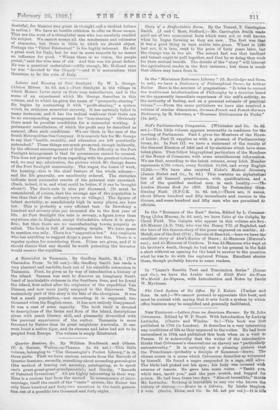Labour and Housing at Port Sunlight. By W. L. George.
(Alston Rivers. as. Od. net.)—Port Sunlight is the village in which Messrs. Lever carry on their soap manufacture, and is the scene of an experiment which Mr. George describes in this volume, and to which he gives the name of "prosperity-sharing." He begins by contrasting it with "profit-sharing," a system, which he criticises somewhat severely. It has certainly failed in many instances, and it has the radical weakness that there can be no corresponding arrangement for "loss-sharing." Obviously there must be peculiar conditions for a successful working. A permanent manufacture, of which the profit may be described as assured, offers such conditions. We see them in the case of the South Metropolitan Gas Company. It is scarcely fair for Mr. George to say that "health, morality, and education are left practically untouched." These things are much promoted, though indirectly, by the efficient encouragement of thrift. The difficulty in the Port Sunlight arrangement is that its permanence cannot be secured. This does not prevent us from regarding with the greatest interest, and, we may say, admiration, the picture which Mr. George draws of the Port Sunlight community. The wages, the hours of work, the housing—this is the chief feature of the whole scheme— and the life generally, are excellently ordered. The statistics indicate most successful results of the paternal rule exercised. (Such, indeed, it is, and what could be better, if it can be brought about ?) The death-rate is nine per thousand. (It must be remembered, of course, that the average age of the population is less than that of the ordinary town or village.) The figures of infant mortality, so scandalously high in many places, are here low. This is probably a very efficient test. In Dewsbury a hundred and seventy-nine per thousand die in the first year of life. At Port Sunlight the rate is seventy, a figure lower than anywhere else in England, except Oxfordshire, where it is sixty- five ; but then there are no manufacturing towns, properly so called. The book is full of interesting details. We have space to mention one only. There is a " suggestion box." Any employee who has anything to suggest drops a paper into this. There is a regular system for considering them. Prizes are given, and if it should chance that any should be worth patenting the inventor would receive the royalties.










































 Previous page
Previous page